Discover how a bimodal integration strategy can address the major data management challenges facing your organization today.
Get the Report →Import NetSuite Data Using Azure Data Factory
Use CData Connect Cloud to connect to NetSuite Data from Azure Data Factory and import live NetSuite data.
Microsoft Azure Data Factory (ADF)) is a completely managed, serverless data integration service. When combined with CData Connect Cloud, ADF enables immediate cloud-to-cloud access to NetSuite data within data flows. This article outlines the process of connecting to NetSuite through Connect Cloud and accessing NetSuite data within ADF.
CData Connect Cloud offers a cloud-to-cloud interface tailored for NetSuite, granting you the ability to access live data from NetSuite data within Azure Data Factory without the need for data replication to a natively supported database. Equipped with optimized data processing capabilities by default, CData Connect Cloud seamlessly channels all supported SQL operations, including filters and JOINs, directly to NetSuite. This harnesses server-side processing to expedite the retrieval of the desired NetSuite data.
About NetSuite Data Integration
CData provides the easiest way to access and integrate live data from Oracle NetSuite. Customers use CData connectivity to:
- Access all editions of NetSuite, including Standard, CRM, and OneWorld.
- Connect with all versions of the SuiteTalk API (SOAP-based) and SuiteQL, which functions like SQL, enabling easier data querying and manipulation.
- Access predefined and custom reports through support for Saved Searches.
- Securely authenticate with Token-based and OAuth 2.0, ensuring compatibility and security for all use cases.
- Use SQL stored procedures to perform functional actions like uploading or downloading files, attaching or detaching records or relationships, retrieving roles, getting extra table or column info, getting job results, and more.
Customers use CData solutions to access live NetSuite data from their preferred analytics tools, Power BI and Excel. They also use CData's solutions to integrate their NetSuite data into comprehensive databases and data warehouse using CData Sync directly or leveraging CData's compatibility with other applications like Azure Data Factory. CData also helps Oracle NetSuite customers easily write apps that can pull data from and push data to NetSuite, allowing organizations to integrate data from other sources with NetSuite.
For more information about our Oracle NetSuite solutions, read our blog: Drivers in Focus Part 2: Replicating and Consolidating ... NetSuite Accounting Data.
Getting Started
Configure NetSuite Connectivity for ADF
Connectivity to NetSuite from Azure Data Factory is made possible through CData Connect Cloud. To work with NetSuite data from Azure Data Factory, we start by creating and configuring a NetSuite connection.
CData Connect Cloud uses a straightforward, point-and-click interface to connect to data sources.
- Log into Connect Cloud, click Connections and click Add Connection
- Select "NetSuite" from the Add Connection panel
-
Enter the necessary authentication properties to connect to NetSuite.
The User and Password properties, under the Authentication section, must be set to valid NetSuite user credentials. In addition, the AccountId must be set to the ID of a company account that can be used by the specified User. The RoleId can be optionally specified to log in the user with limited permissions.
See the "Getting Started" chapter of the help documentation for more information on connecting to NetSuite.
![Configuring a connection (Salesforce is shown)]()
- Click Create & Test
-
Navigate to the Permissions tab in the Add NetSuite Connection page and update the User-based permissions.
![Updating permissions]()
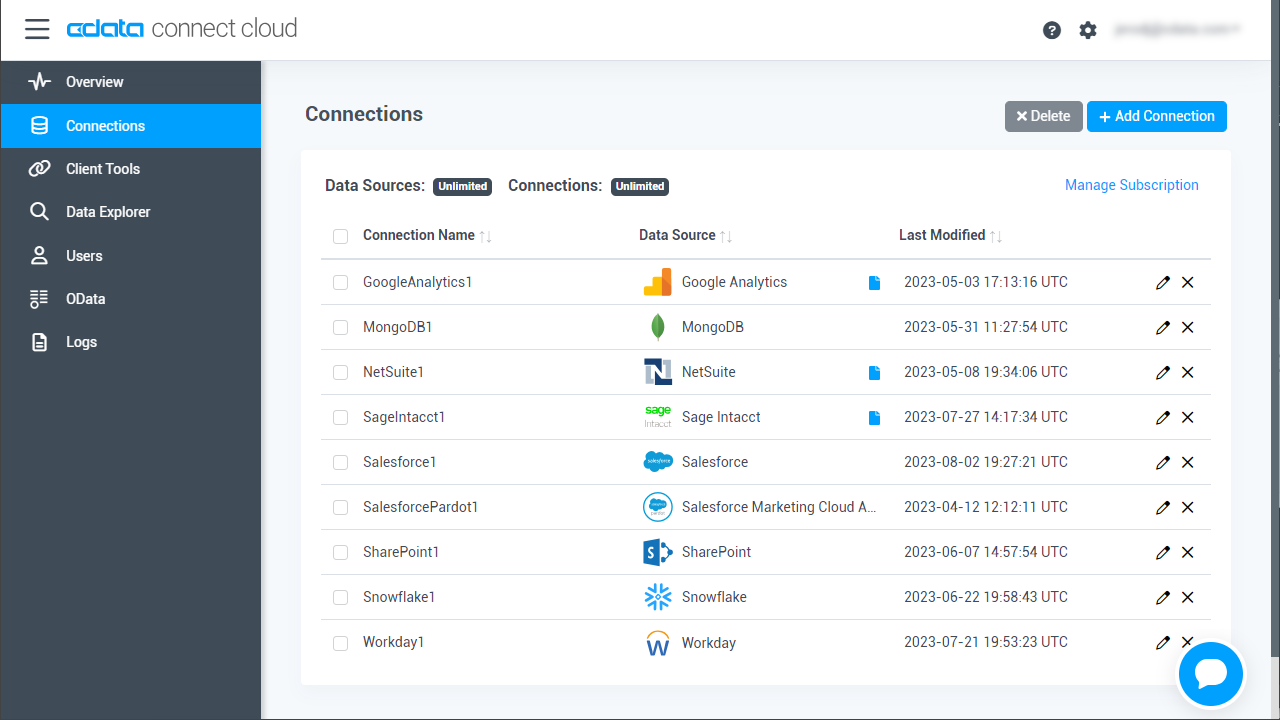
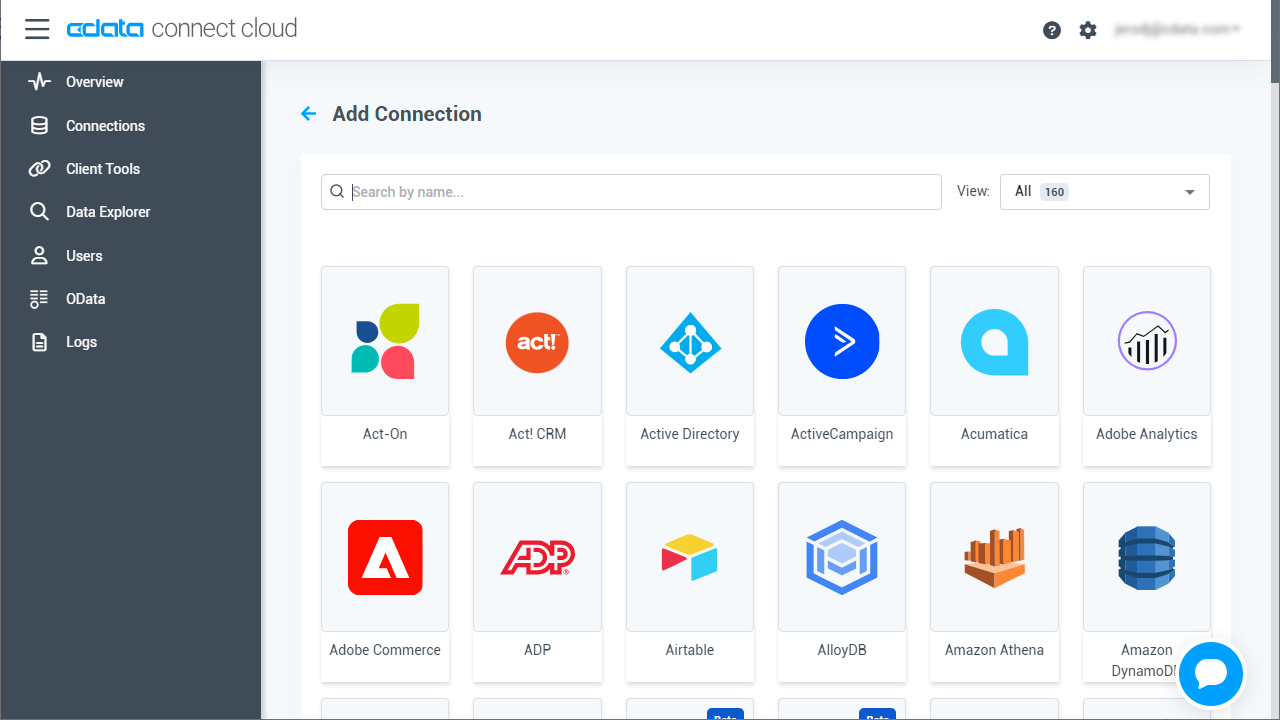
Add a Personal Access Token
If you are connecting from a service, application, platform, or framework that does not support OAuth authentication, you can create a Personal Access Token (PAT) to use for authentication. Best practices would dictate that you create a separate PAT for each service, to maintain granularity of access.
- Click on your username at the top right of the Connect Cloud app and click User Profile.
- On the User Profile page, scroll down to the Personal Access Tokens section and click Create PAT.
- Give your PAT a name and click Create.
- The personal access token is only visible at creation, so be sure to copy it and store it securely for future use.
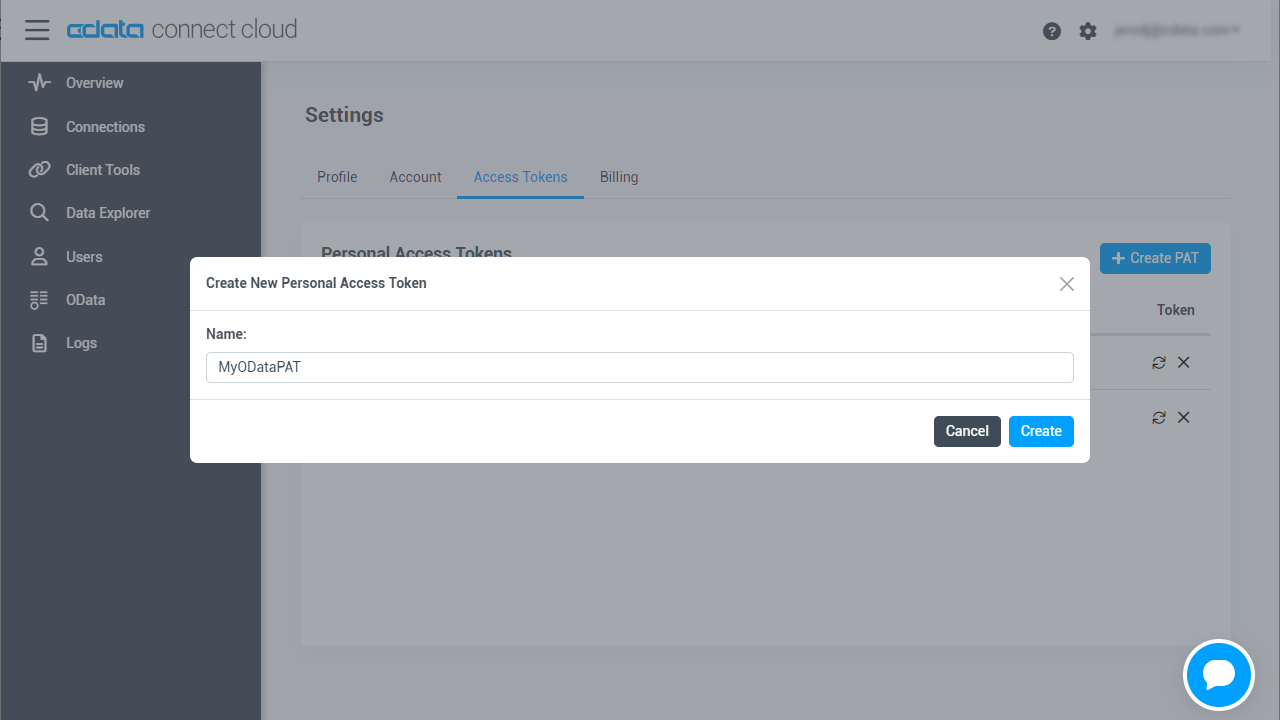
With the connection configured, you are ready to connect to NetSuite data from Azure Data Factory.
Access Live NetSuite Data in Azure Data Factory
To establish a connection from Azure Data Factory to the CData Connect Cloud Virtual SQL Server API, follow these steps.
- Login to Azure Data Factory.
- If you have not yet created a Data Factory, Click New -> Dataset.
- In the search bar, enter SQL Server and select it when it appears. On the following screen, enter a name for the server. In the Linked service field, select New.
-
Enter the connection settings.
- Name - enter a name of your choice.
- Server name - enter the Virtual SQL Server endpoint and port separated by a comma: tds.cdata.com,14333
- Database name - enter the Connection Name of the CData Connect Cloud data source you want to connect to (for example, NetSuite1).
- User Name - enter your CData Connect Cloud username. This is displayed in the top-right corner of the CData Connect Cloud interface. For example, [email protected].
- Password - select Password (not Azure Key Vault) and enter the PAT you generated on the Settings page.
- Click Create.
- In Set properties, set the Name, choose the Linked service we just created, select a Table name from those available, and Import schema from connection/store. Click OK.
- After creating the linked service, the following screen should appear:
- Click preview data to see the imported NetSuite table.
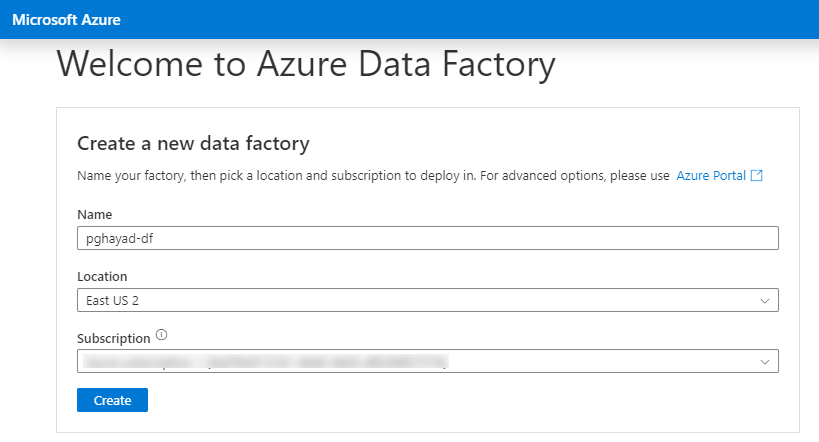
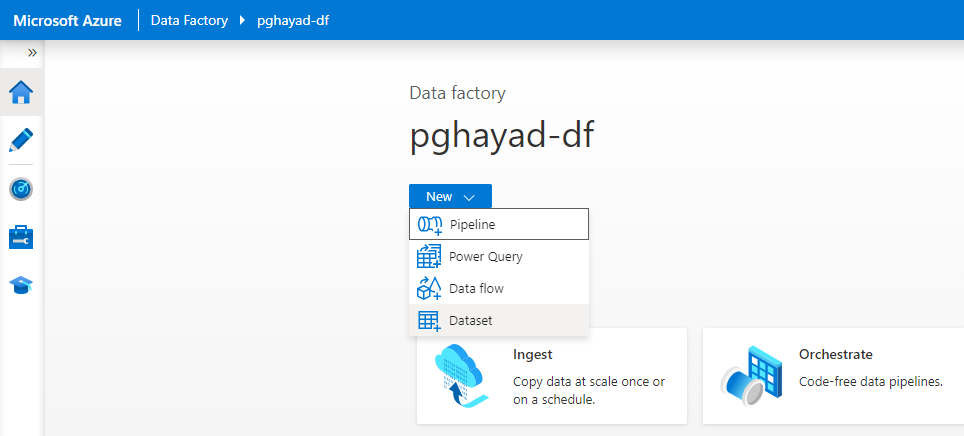
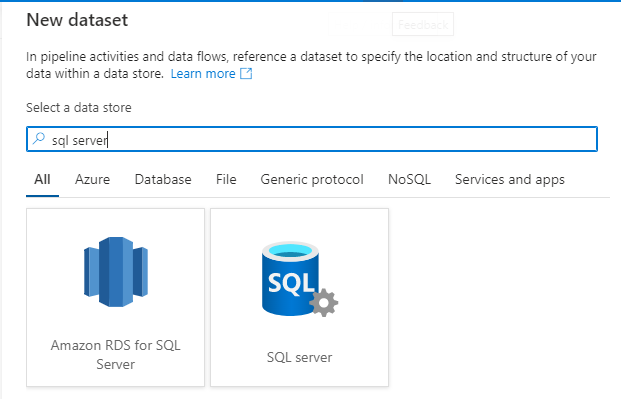
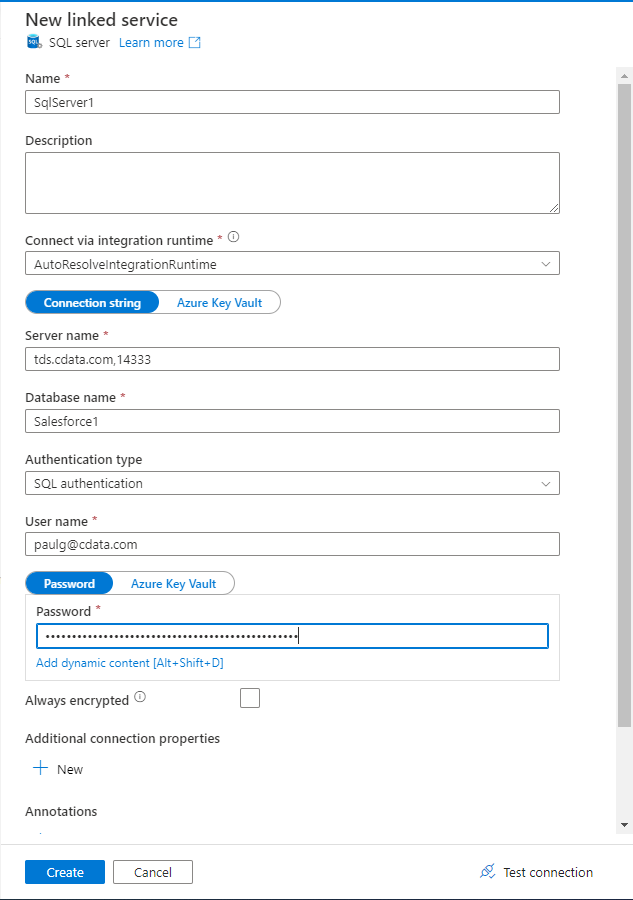
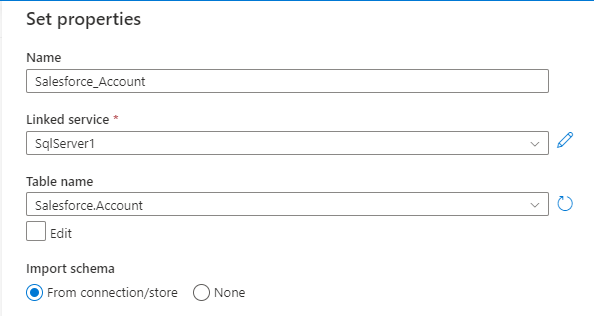
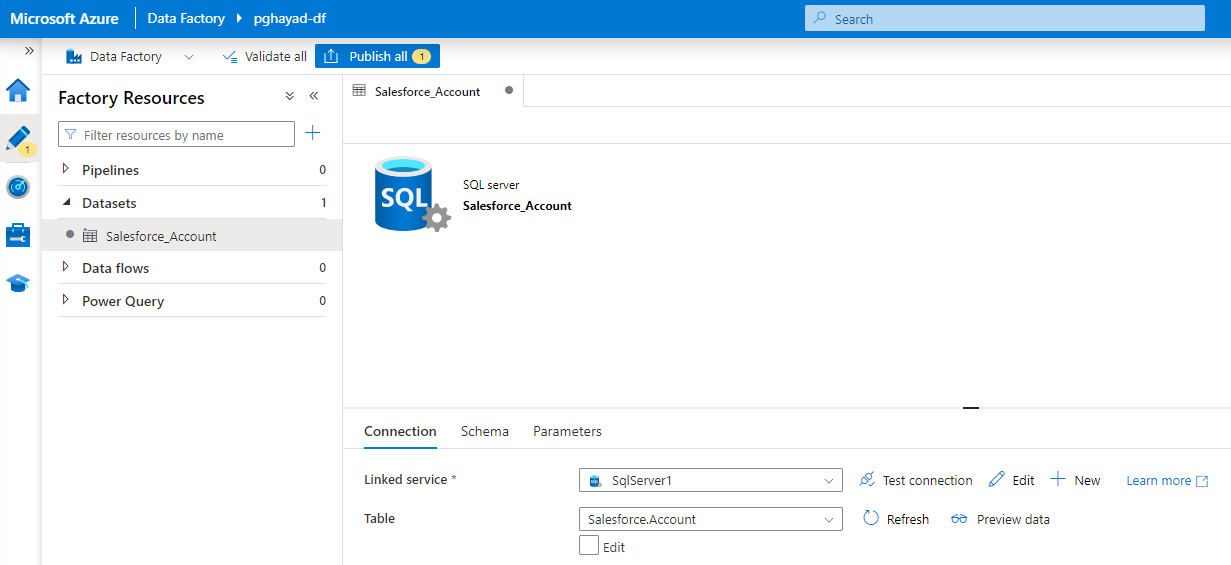
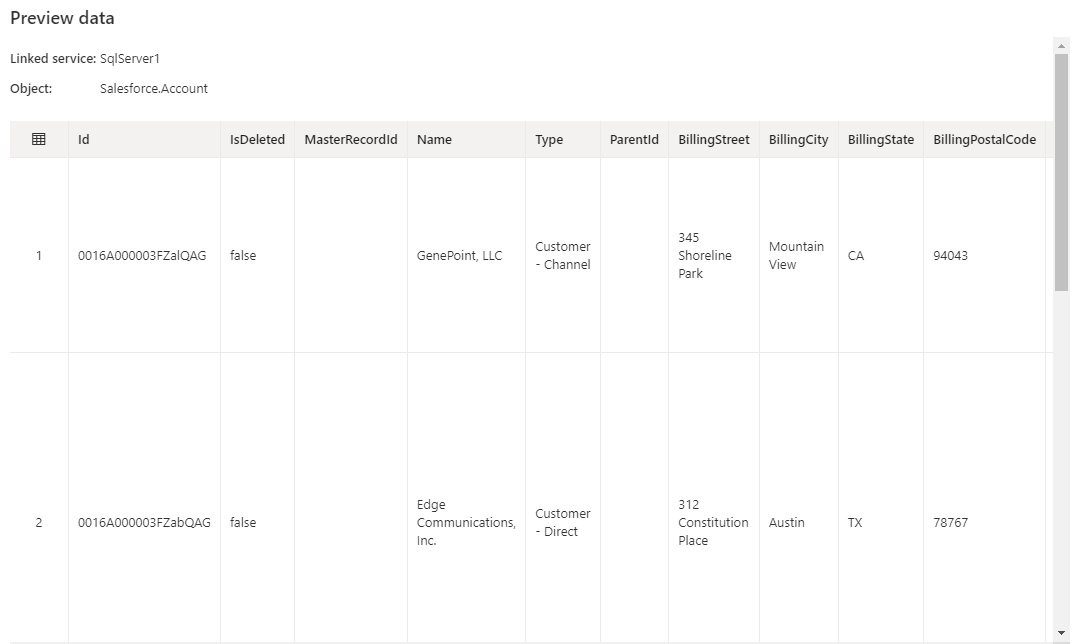 You can now use this dataset when creating data flows in Azure Data Factory.
You can now use this dataset when creating data flows in Azure Data Factory.
Get CData Connect Cloud
To get live data access to 100+ SaaS, Big Data, and NoSQL sources directly from your cloud applications, try CData Connect Cloud today!







